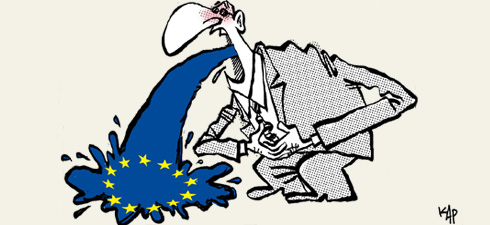Mario Monti, Italy's prime minister, and Herman van Rompuy, president of the Council of the European Union, launched on Saturday the idea of holding an extraordinary summit in Rome to discuss the future of the European idea and to arrest the growth of populism and Euroscepticism. At a time when populist parties of different stripes are growing not only in political power but, holding high the banners of their opposition to European integration in the name of the people and national sovereignty, particularly in their capacity to shape public discourse, the theme is an important one. The summit initiative, however, is coming from two leaders with tenuous democratic legitimacy and may prove misguided if it tries to lump different populisms together with the necessary criticism of the way the EU currently proceeds.
If the issue were not so serious, it would seem ironical: the only two leaders who are sitting on the Council of the EU without having had to stand for popular election to it are proposing a summit to sort out European public opinion and the citizenry on the error of Euroscepticism. They are doing it through their participation in the exclusive Ambrosetti Forum, an annual get-together of select Italian and international politicians and businessmen at a luxury hotel by Lake Como – just the type of event, in the style of Davos, that brings together political and business elites to discuss the way of the world away from the hassle of the little people.
Monti's proposal to Van Rompuy is none other than – yet another extraordinary summit! When Europe is ill from summitis, exhausted from meetings at the highest level that ultimately come up with the most meagre of results, to propose yet another to build up once again the public’s hopes for Europe reveals the abyss that divides these unelected leaders from a broad swathe of public opinion.
Van Rompuy and Monti represent two variants of the technocratic Europe that many citizens, and not just populist, want to get behind them. Van Rompuy was appointed secretively and by surprise at an informal dinner of heads of government, who were looking for a dull chap to hold a position that was already devoid of any possibility of playing any role in the internal political process, let alone respond to or connect with citizens directly. Van Rompuy concentrates in his person the contradictions of the convoluted institutional structure put in place by the Lisbon Treaty and the desire of the states to get rid of any charismatic figure who could act as a counterweight.
The void of legitimacy
Monti in turn represents a new kind of technocratic government, which strains to the limit the normal political mechanisms of the Member States to replace elected politicians when the latter are unable to ensure the credibility of the government to carry out reforms and cuts in the time and manner chosen by the European centres where the decisions are made – Brussels, Frankfurt (European Central Bank headquarters) and Berlin.
The crisis of the single currency casts in doubt the Monnet method, dating back to the 1960s, which consists of slinking quietly forward towards integration with little steps that make inevitable the following surrender of sovereignty, and questions something more than the method: the legitimacy of a few to make decisions of great significance for the citizens of the Member States without subjecting themselves to the scrutiny of the ballot boxes. Monti and Van Rompuy, born in the 1940s, are not the face of the future, but the last representatives of that group that wanted to govern for the good of the Europeans in the name of peace, without taking into account the need to strengthen the democratic credentials of the European project.
Admittedly, the two presidents at least got the theme right: it is important to talk about politics and defend the integration project not just from the battering of the markets but also from public disillusionment. They are hardly the ones, though, to fill the void of legitimacy that is giving rise to the spread of populism. In particular, their initiative can turn out to be harmful if, resting on a fragile and indirect political legitimacy, it tries to combat perfectly democratic positions.
The scepticism – so far, the enemy to beat by supporters of a united Europe – has proved an important component in the European debate: had it been given more room in the fundamental debates over the past two decades, it might have helped avoid some design errors in the integration project and saved us from some of the current turmoil. Rather than accuse populists and eurosceptics, decision-makers in the EU should rather be concerned with disarming their critics and improving the democratic system. In the long run, it would be a bad idea for democrats to force us to choose between elected populists and Europhile technocrats.
Was this article useful? If so we are delighted!
It is freely available because we believe that the right to free and independent information is essential for democracy. But this right is not guaranteed forever, and independence comes at a cost. We need your support in order to continue publishing independent, multilingual news for all Europeans.
Discover our subscription offers and their exclusive benefits and become a member of our community now!












